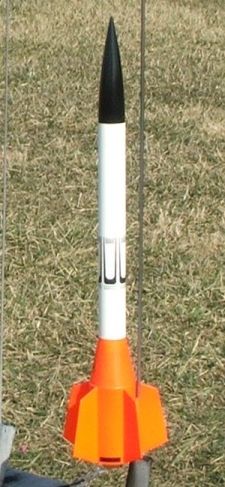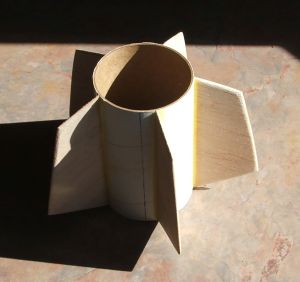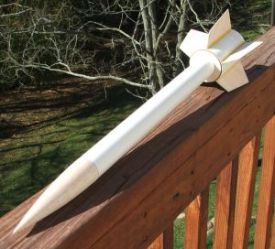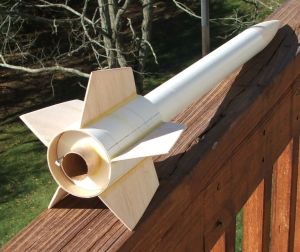Scratch SLS Vector V Original Design / Scratch Built
Scratch - SLS Vector V {Scratch}
Contributed by Bill Eichelberger
| Manufacturer: | Scratch |

Brief:
This is an upscaled version of the Centuri Vector V made entirely with Semroc
parts, hence the SLS designation. While not an official Semroc release, it
would seem to fit in well with the current trend toward upscales of Centuri
classics (the SLS Laser X being a perfect example).
Construction:
The parts list:
- LT-22580 lower body tube
- ST-13180 main body tube
- 5.0" ST-9 engine tube
- CR-2050 engine block
- BC-1354 balsa nose cone
- 2 CR-913 centering rings
- 2 CR-9225P centering rings
- 1/8" balsa fin stock
- long engine hook
- large screw eye
- metal washer for nose weight
- 2 large snap swivels
The first thing I had to do when starting this project was figure out the upped scale dimensions. (Since this involves math, it's never easy for me.) With two completely different sizes of tubes used in the original Vector V, I figured that I was going to have two wildly different scales between the top and bottom sections, but I lucked out. The ST-13 is roughly 1.765 times as big in diameter as the ST-7, while the LT-225 is 1.746 times as big in diameter as the ST-13. While not exact, they were close enough for my personal tolerances.
 I started
on the fin can first by marking off the locations for the five fins. I had
upscaled the fin pattern by 175% using a work copier, and to my surprise, the
fins came out sized perfectly. After shaping them, I attached them to the fin
can using Loc Tite Gel CA then double filleted them with Elmer's Wood Glue.
I started
on the fin can first by marking off the locations for the five fins. I had
upscaled the fin pattern by 175% using a work copier, and to my surprise, the
fins came out sized perfectly. After shaping them, I attached them to the fin
can using Loc Tite Gel CA then double filleted them with Elmer's Wood Glue.
Under the skin, the SLS Vector V is a mass of centering rings. Some of them, which there was no call for them, didn't exist when this project started. Three sets were needed to allow all of the pieces to mesh together into a sturdy bottom end. An email to Carl McLawhorn at Semroc resulted in a set of previously unavailable CR-9225 centering rings that would mate the fin can to the motor tube. They slid together like they were made for each other, which they were. A second set of CR-913 rings mated the motor tube to the main body tube, and a third connected the LT-225 fin can and the ST-13 main body tube.
The recovery system was secured by tying 150# Kevlar® to the motor tube and passing it through the centering rings, knotting it, and gluing it along the way. I used almost four feet of Kevlar® and an equal amount of 1/8" sewing elastic to lessen the chances of nose cone rebound. (Next time I'll use five feet.) The nose cone was attached with a heavy duty screw eye and a large washer to better distribute the weight.


The shroud was created using a template widget and was printed on heavy paper. It came nowhere close to fitting. A second shroud was then made by upscaling the original by 175%. It fit perfectly. To be fair, this was probably more luck than anything, and the chances that I screwed up with the template widget are high. The shroud was curled and taped into place to check it's fit then secured with gel CA. Once it was glued in place, the entire structure was coated liberally with thin CA to allow it to better withstand the sanding and sealing to come.
Finishing:
After the fill, finish, and sand process, the nose cone was painted gloss black
and the main body tube was coasted in gloss white. The lower section was then
painted florescent orange, which I (correctly) thought might come in handy
during the post-flight searches that would come later. Before the decal process
began, the entire rocket was sprayed with a coat of gloss clear. Decals were
upscaled using a Jasc program then printed off on Bel Decal paper. After they
were applied, the entire structure was again sprayed with gloss clear for
protection.
Flight:
To begin with, I wasn't entirely convinced that this rocket would be stable
without gobs of nose weight, mainly because of the heavy rear section. For this
reason I decided to start the flight day with a C11-5 motor, figuring that the
less powerful motor might cause less damage in the event of an event during
flight. I borrowed an adapter from a fellow Quark member and made the SLS
Vector V the second flight of the day. It turns out I had no reason to worry.
Flight number one arced gently into the wind as it left the pad but did so without a trace of wobble. It maxed out at a respectable height, ejected at apogee, and then gave me a scare by recovering way too close to the access road for my personal comfort. Like many of the rockets flown on that Saturday, it bounced when it hit the ground but suffered no damage.
The second flight was on a D12-5, the next motor up the scale. Boosting surprisingly straight during a rare lull in the gales, the Vector V again ejected right at apogee then recovered safely in the grass, and nowhere near the access road.
Flight #3 was the real adventure and was the flight I had in mind when I started construction. Loaded on an E9-6, the Vector V shot off the pad into the wind, noticeably higher than the previous two flights. Ejection was once again perfect, but it was immediately obvious that the recovery walk was going to be a killer. I watched it descend, mentally marked the spot, then saddled up the van for the drive. (I'm no fool.) Thirty minutes later I found it just about the time that I was considering giving up the search. I had greatly misjudged the distance but had the line right. The bright orange paint was what allowed me to spot the rocket, which had landed in a large, newly cut prairie. There was no water visible for several hundred feet around the landing area except for the 8" x 3' puddle that the Vector V had landed in. The rear of the rocket was sitting in the puddle with the expended casing soaking up water at a rapid rate. I managed to bite the casing out, which was when I noticed the broken fin. I found the missing piece floating in the puddle, but after studying the break, I believe it happened when the nose cone rebounded, not on impact with the ground. The piece just happened to hold on until landing. In that case, I was lucky. The break is fairly clean and looks like it will be a quick and easy fix, but the big Vector will never again have that "fresh from the factory" look to it.
Recovery:
Recovery was handled by a Thrustline 18" nylon chute and a piece of
Perma-Wadding. Both performed flawlessly, although adding even more shock cord
than the 8' I had is an option. (That ejection charge is a killer.)
Summary:
PROs: Semroc parts and service. A much more satisfying project than the 1:1
Vector V, although I need to build another one of those just for the sake of
scale.
CONs: Nose cone rebound with eight feet of shock cord.
 |
 |